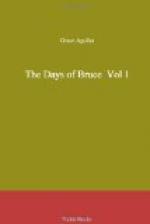“To our loyal and loving subjects of both North and South Britain, Edward, by the grace of God, King of England, Wales, France, and Scotland, greeting. Whereas Isabella, born of Fife, and late of Buchan, which latter she hath, by foul dishonor and utter disregard of marriage vows, now forfeited, hath done traitorously and disloyally alike to her sovereign lord the king, and to her gracious lord and husband, John, Earl of Buchan, whom, for his fidelity, we hold in good favor. As she hath not struck by the sword, so she shall not perish by the sword; but for her lawless conspiracy, she shall be shut up in a stone and iron chamber, circular as the crown she gave, in this proclaiming to both countries her everlasting infamy. And this we do in mercy; for, whereas she deserveth death, we do remit the same, and give her time to repent her of her heinous crime.
“Given at our palace of Carlisle, this twenty-third day of February, in the year of our Lord and Saviour, one thousand three hundred and seven. God save the King!”
But the loyal ejaculation was not echoed, nay, the herald himself had read the proclamation, as if every word had been forced from him, and the eyes of every knight and soldier had been fixed upon the ground, as if shame rested on them rather than on their prisoner. A dead silence for a few minutes followed, broken only by some faint cries of “God save King Edward, and down with all traitors!” which seemed raised more to drown the groans which involuntarily burst forth, than as the echo of the heart. They dared not evince the faintest sign of disapproval, for they stood on precarious ground; a groan even might be punished by their irritable king as treachery; but there was one present who cared little for this charge. Scarcely had the words passed the herald’s lips, before a young man, whose bare head and lack of all weapons would have proclaimed him one of the Earl of Hereford’s prisoners, had not the attention of all been turned from him by the one engrossing object, now snatching a sword from a soldier near him, sprung from his horse, and violently attacking the herald, exclaimed, in a voice of thunder—
“Liar and slave! thinkest thou there is none near to give the lie to thy foul slanders—none to defend the fair fame, the stainless honor of this much-abused lady? Dastard and coward, fit mouthpiece of a dishonored and blasphemous tyrant! go tell him, his prisoner—aye, Nigel Bruce—thrusts back his foul lies into his very teeth. Ha! coward and slave, wouldst thou shun me?”
A scene of indescribable confusion now ensued. The herald, a man not much in love with war, stood cowering and trembling before his adversary, seeking to cover himself with his weapon, but, from his trembling hold, ineffectually. The stature of the youthful Scotsman appeared towering, as he stood over him with his uplifted sword, refusing to strike a defenceless man, but holding him with a gripe of iron; his cheek




